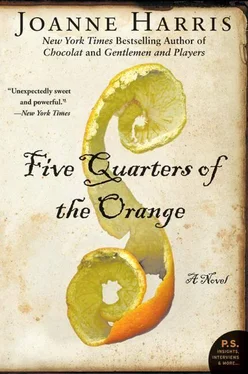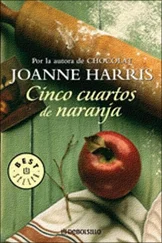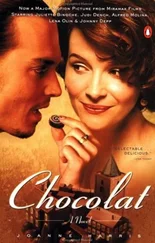NAZI WHORE, one read. Another, on the side of the goat shack, read, OUR BROTHERS AND SISTERS DIED FOR YOU.
But Mother treated it all with indifferent contempt. She bought her milk from Crécy when the Hourias farm ran dry and posted her letters in Angers. No one spoke directly to her, but when Francine Crespin spat at her feet one Sunday morning on the way back from church Mother spat back, right in Francine’s face, with remarkable speed and accuracy.
As for us, we were ignored. Paul still spoke to us occasionally, though not when anyone else was there to see. Adults seemed not to notice us, but from time to time someone like crazy Denise Lelac might give us an apple or a piece of cake to stuff in our pockets, murmuring in her cracked old voice, “Take it, take it, for God’s sake, it’s a pity you children should be caught up in such a business,” before hurrying on her way, her black skirts dragging in the sour yellow dust and her shopping basket clutched tightly in her bony fingers.
By the next day everyone was saying that Mirabelle Dartigen had been the Germans’ whore, and that was why her family had been spared retribution. By Tuesday some people had recalled that our father had once expressed sympathy for the Germans. On Wednesday night a group of drunks- La Mauvaise Réputation, had never reopened, and people grow bitter and violent drinking alone-came to yell abuse at our closed shutters and to throw stones. We stayed in our bedroom with the light off, trembling and listening to the half-familiar voices, until Mother went out to break it up. That night they went quietly. The following night they left noisily. Then came Friday.
It was just after supper. It had been gray and dank all day, as if an old blanket had been thrown across the sky, and people were hot and prickly. Night brought little comfort, rolling a whitish mist across the fields so that our farmhouse seemed an island, mist seeping damply under doors and around window frames. We had eaten in silence as had become usual, and with little appetite, though I remember Mother had made an effort to make what we liked best. Bread freshly baked and scattered with poppy seeds, fresh butter from Crécy, rillettes , slices of andouillette from last year’s pig, hot sizzling pieces of boudin in its grease, and black buckwheat pancakes toasted in the pan, as crispy and fragrant as autumn leaves on the plate. Mother, trying hard to be cheerful, served us sweet cider from earthen bolées but took none for herself. I remember she smiled constantly and painfully throughout the meal, sometimes giving a sharp bark of false laughter, though none of us said anything funny.
“I’ve been thinking.” Her voice was bright and metallic. “Thinking we may need a change of air.” We looked indifferently at her. The smell of grease and cider was overpowering.
“I was thinking of going to visit Tante Juliette in Pierre-Buffière,” she continued. “You’d like it there. It’s in the mountains, on the Limousin. There are goats and marmots and-”
“There are goats here,” I said in a flat voice.
Mother gave another of those brittle, unhappy laughs. “I should have known you’d have some objection,” she said.
I met her eyes with mine. “You want us to run away,” I said.
For a minute she pretended not to understand.
“I know it sounds like a long way to go,” she said with that forced cheeriness. “But it’s really not that far, and Tante Juliette will be so pleased to see us all-”
“You want us to run away because of what people are saying,” I said. “That you’re a Nazi whore.”
Mother flushed. “You shouldn’t listen to gossip,” she said in a sharp voice. “Nothing good ever comes of it.”
“Oh, so it isn’t true, then, is it?” I asked simply to embarrass her. I knew it wasn’t-couldn’t imagine it to be true. I’d seen whores before. Whores were pink and plump, soft and pretty, with wide, vapid eyes and painted mouths like Reinette’s cinema actresses. Whores laughed and squealed and wore high-heeled shoes and carried leather handbags. Mother was old, ugly, sour. Even when she laughed, it was ugly.
“Of course not.” Her eyes did not meet mine.
Insistently: “So why are we running away?”
Silence. And in the sudden silence we heard the first harsh murmur of voices outside, and in it the clanking of metal and kicking of feet, even before the first stone hit the shutters. The sound of Les Laveuses in all its petty spite and vengeful anger, people no longer people now-no Gaudins or Lecozes or Truriands or Duponts or Ramondins-but members of an army. Peering out of the window we saw them gathered outside our gate, twenty, thirty or more of them, mostly men but some women too, some with lamps or torches like a late harvest-procession, some with pocketfuls of stones. As we watched and light from our kitchen spilled out across into the yard, someone turned to the window and threw another stone, which cracked the old wooden frame and sprayed glass into the room. It was Guilherm Ramondin. I could hardly see his face in the flickering reddish light of the torches, but I could feel the weight of his hate even through the glass.
“Bitch!” His voice was hardly recognizable, thickened with something more than drink. “Come out, bitch, before we decide to come in there and get you!” A kind of roar accompanied his words, punctuated by stamping, cheering and a volley of fistfuls of gravel and clods that spattered against our half-closed shutters.
Mother half-opened the broken window and shouted out. “Go home, Guilherm, you fool, before you pass out and someone has to carry you!” Laughter and jeering from the crowd. Guilherm shook the crutch on which he had been leaning.
“Brave talk for a German bitch!” he yelled. His voice sounded rough and beery, though his words were barely slurred. “Who told them about Raphaël, eh? Who told them about La Rép? Was it you, Mirabelle? Did you tell the S.S. that they killed your lover?”
Mother spat out of the window at them. “Brave talk!” Her voice was shrill and high. “You’re one to be talking bravery, Guilherm Ramondin! Brave enough to be standing drunk outside an honest woman’s house, frightening her kids! Brave enough to get sent home in the first week of battle while my husband got killed!”
At this Guilherm gave a roar of fury. Behind him the crowd joined in hoarsely. Another volley of stones and earth hit the window, sending pieces of earth spattering across the kitchen floor.
“You bitch!” They were through the gate now, pushing it up and off its rotten hinges with ease. A dog barked once, twice, then fell quiet with a sudden yelp. “Don’t think we don’t know! Don’t think Raphaël didn’t tell anyone!” His triumphant, hateful voice rang out even above the rest. In the red darkness below the window I could see his eyes as they reflected the firelight like a crazywork of broken glass. “We know you were trading with them, Mirabelle! We know Leibniz was your lover!” From the window Mother hurled a jug of water onto the nearest members of the crowd.
“Cool you off!” she screamed furiously. “You think that’s all people can think about? You think we’re all at your level?”
But Guilherm was already through the gate and pounding on the door, undeterred. “Get out here, bitch! We know what you’ve been doing!”
I could see the door trembling on its latch beneath the pressure of his blows. Mother turned to us, her face blazing with rage.
“Get your things! Get the cash box from under the sink. Get our papers!”
“Why-but-”
“Get them, I tell you!”
We fled.
At first I thought the crash-a terrible sound that shook the rotten floorboards-was the sound of the door coming down. But when we returned to the kitchen we saw that Mother had pulled the dresser across the door, breaking many of her precious plates in the process, and was using it to barricade the entrance. The table, too, had been dragged toward the door, so that even if the dresser gave way no one could enter. She was holding my father’s shotgun in one hand.
Читать дальше












